The Principal of BHC Medical Centre, Dr Andrew Le, is the inventor of Clark Compound formulation. It was the result of 15 years of his clinical research and patient study. In searching for the cure of his Son’s eczema and his own dermatitis on his hands, he had discovered the actual cause of eczema. His findings were the foundation of his formulation and the base of his new theory about eczema: it is the combination of a skin barrier defect and microorganism invasion. The effectiveness of his treatment on more than two thousand patients had confirmed his findings and theories.
These photos are of the patients who were treated with his formulation and skin care products. They had achieved years of remission i.e. no recurrence of their eczema, with ongoing use of BHC Skin Care products without any medication.
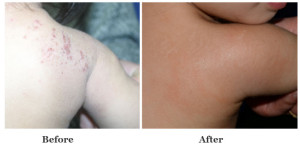
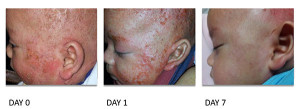
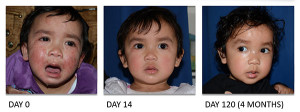
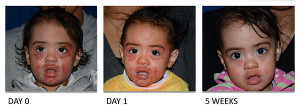
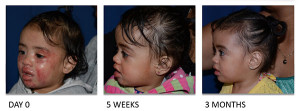
On going use of BHC skin care products have helped these patients achieved remission (lack of symptoms) for several years
Click here to see Dr Le’s Eczema Study…What is eczema?
Eczema or atopic dermatitis (AD) is a chronic inflammatory skin disease characterised by red, dry, scaly, thickened skin. It is typical to have scratch marks due to the intense and itchy rash that develops with the condition. It is very common to see signs of dry, crusty blood over the lesions. The skin sometimes can be weeping and oozing due to a secondary infection (impetigo). The disease varies in frequency and severity among patients. It is not a minor skin disorder. It can be a major handicap with considerable personal, social and financial consequences, not only to the person suffering from it, but also for his or her family and community.
What cause eczema?
The old school of thought believes that eczema is caused by allergy leading to abnormal functioning of immune system.
These views have been constantly challenged by evidence of current research which links this inflammatory disease to compromised skin barrier due to genetic mutation. Skins of these patients are also proven to be lack of adequate antimicrobial peptides which is our first line of depend against microorganisms and lack of natural moisturizers. The lack of optimal ability of the skin to repair and to fight microorganism have led to hyperactive and dysfunctional immune system. Abnormal immune system functioning is the clinical manifestation of eczema but not the cause! These deregulated immune system activity is a desperate attempt of the skin to repair and to rid of invasive microorganisms. Treatments which aim to restore or enhance skin barrier and to kill microbes have been proven to improve eczema.How common is eczema in Australia?
Australia is among the countries with the highest prevalence of eczema or atopic dermatitis. The current prevalence of eczema in Australia is between 10 to 15 per cent of the population. Recent research conducted at the University of Melbourne showed that around one in three infants (38.5%) suffer from eczema. Most children with atopic dermatitis grow out of the disease when their skin matures, but about 10 percent will continue to suffer with eczema into adulthood.
Eczema does not discriminate by social, economic or ethnic groups. In the past few decades with no apparent cause or reason, there is a stiff rise in the incident of dermatitis, especially in developed countries. A few have linked this to overly hygienic practices in modern societies. For example: lots of cleansing agents, hot baths, bubble baths, hot showers daily with a lot of soap and skin scrubbing, multiple hand washes with antibacterial soaps and scrubbing. These are physical “abuses” to the skin and in turn compromises our skin barrier, which is the first line of defense against microorganisms. This may explain the lower incidence of dermatitis in underdeveloped countries, since soap and bubble baths etc. can be a luxury which many may not be able to afford.
The Eczema Association of Australasia estimates that the average out-of-pocket amount spent on products per year to treat one patient with AD is $425, with costs ranging from $13.50 to more than $2,000 per individual. As Heather Jacobs, the National President of the Eczema Association of Australasia, says in their website, eczema really is a common, frustrating and often debilitating skin disease that can have a significant physical and emotional toll on sufferers and their carers’ quality of lifet should you do if you have eczema?
Up to 10 per cent of childhood eczema will carry into adulthood. These patients will continue to have ‘imperfect skin’—dry skin lacking the abilities to heal properly or fight against microorganisms. This occurs because of a lack of special proteins such as fillagrin and natural moisturising factor (NMF) due to genetic mutation of patients’ skin.
The risk of recurrence is high if their skin is not protected in the best way possible.
Moisturiser is an essential part of healthy skin maintenance and should be continued indefinitely. Dryness can predispose your skin to problems.
By focusing on protecting the skin barrier—using lots of moisturiser, avoiding contact with irritants and other measures—it is possible to strengthen imperfect skin and lead a normal life.
People with a history of atopic dermatitis should apply a cream that is strong enough to kill all the opportunistic microorganisms at the first sign of a broken or weakened skin barrier. This applies to even a tiny scratch, an insect bite, cut, abrasion or burn. The cream they use should be gentle enough to promote skin healing, with the ability to close up the ‘entry points’ of micro-organisms. Ideally it should also control itchiness. If you take such precautions, you can prevent the recurrence of these skin conditions. The most important part of any skin treatment therapy is the control of scratching and itchiness. Scratching worsens eczema, leading to increased itching and more scratching. We need to break this vicious cycle to help the skin to repair itself. Whatever it takes, people with eczema must stop scratching. Even rubbing on the lesion is bad. Antihistamines can offer some relief.
An effective treatment will promote a new healthy skin layer to replace ‘bad’ skin. New skin is very delicate and can be damaged easily by scratching. If you scratch, your skin will never have a chance to get better. It is important to stop the scratching. Scratching can happen during sleep, be habitual or subconscious scratching. These issues need to be identified and treated. It is also necessary to avoid contact with allergens. Even though skin allergy is not a cause of eczema, it can trigger or worsen existing lesions. Coming into contact with allergens leads to itchy skin, inevitably causing constant scratching. Scratching, as mentioned before, compromises the skin barrier. It interferes with skin repair and, at the same time, provides an entry point for microorganisms.
Avoid bubble bath because it causes skin dehydration. Avoid prolonged hot showers because they remove the natural moisturiser from your skin. Applying a thick layer of moisturiser before jumping in the pool helps create a second skin for regular swimmers. After the swim, apply moisturiser again to replace the natural oils lost.
Avoid contact with chemicals and wear gloves when possible. Your gloves must be dry and clean, because wet or dirty gloves are worse than no gloves at all. Avoid using soap and shower gel, if you can. Avoid skin scrubbing and use gentle cleansing agents or only water.”